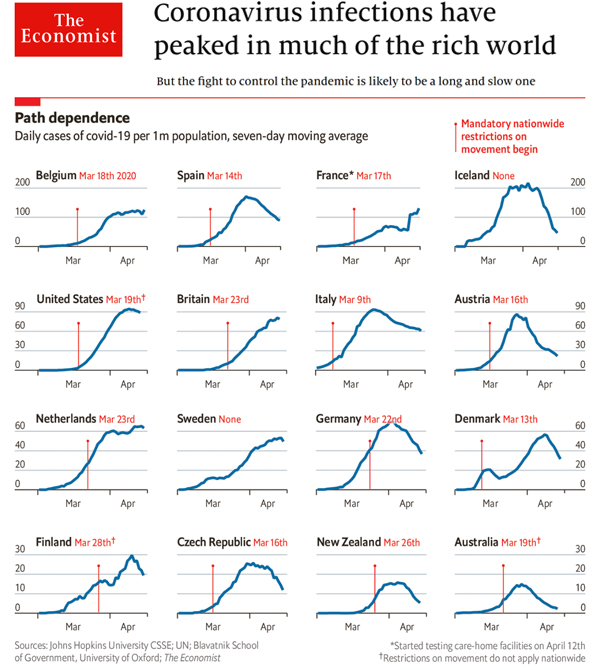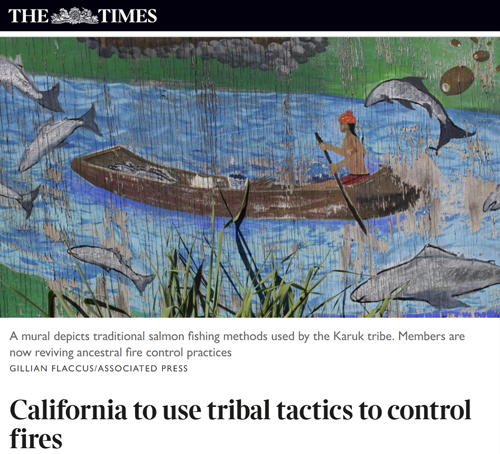Perspectives on the week’s headlines
By Liza Horan, Editor
Photos courtesy Pexels.com; screen shots from news sources

As lockdown measures were extended for a minimum of three more weeks in the UK, politicians were prompted on strategies to stream back to “normal life.” While no single plan has been agreed or announced, authorities have cautioned that there’s likely to be a gradual transition to free movement and re-opening of public institutions, businesses, and other places.
No one can answer when such a plan would take place, but it will be triggered by a sustained decrease in the number of coronavirus cases.
The past few months have seen a variety of approaches to handling the pandemic or experiments on how to best protect populations. Some places, like China, took extreme measures quickly to isolate those infected, while European countries like Italy and Spain were at first slow to enact social isolation but then held steady on mass quarantines. The laissez-faire approach taken by Sweden and Iceland merely encouraged social isolation, counting on herd immunity. And Belarus has taken no measures. In all, 3.9 billion people have been in mandatory lockdown across 92 countries, as of 8 April, according to the Blavatnik School of Government at Oxford University.

The Economist reports that most “rich nations” are beyond the peak of new cases, giving hope to relief of movement restrictions. This week Spain allowed construction work to resume, Denmark opened primary schools and nurseries, and Germany, Italy and Austria are slowly allowing some shops to re-open.
“Timing the process is tricky; countries want to make sure that infections are decreasing convincingly before ending lockdowns. One problem is that countries have adopted vastly different testing regimes, so may have only imperfect information on the prevalence of the virus. Britain, for example, has tested just 341,000 of its citizens to date,” The Economist story says. “The maximum death tolls come some weeks after the peak in infections. And bringing the infections under control will take longer still. Until there is a vaccine or a drug to kill the coronavirus, a resurgence of the epidemic will be an ever-present danger.”
Virus on the move: The WHO reports more than 2.47 million cases and 169,000 deaths globally as Asia is hit with a second wave of infection, and coronavirus is now moving across Africa, Russia and South America. But the biggest impact may not be deaths from the virus as much as from the halt in transport and food aid to poor countries. The Guardian reports on how the “pandemic will cause famine of biblical proportions.“
UK is running the world’s biggest drug trial and results are expected in June. The study involves people who have recovered from coronavirus and already there are more than 5,000 participants; they are seeking more.
Women have genetic advantage: Most patients dying are men and scientists attribute this to women’s double-x chromosome. “Oestrogen is shown to increase the antiviral response of immune cells,” according to this story.
Wear a mask: Scientists now advise wearing face masks in public and they do not have to be “medical grade.” You can fashion your own with no sewing required.
Scam alert: Beware of fake cures and counterfeit masks being sold. “Counterfeit masks and latex gloves, fake home testing kits, sinister goods such as preventative drugs and fictional vaccines are making appearances online and being sold to fearful customers through dubious texts, emails, calls and social media adverts,” Alex Lee writes in Wired UK. “In the last two weeks alone, cybersecurity provider Mimecast has seen over 59,700 maliciously spoofed coronavirus related websites pop up on the internet. Of these sites, 302 were selling home testing kits, while 44 of them made reference to a coronavirus cure. (There is no such thing).”

Homeopathy questioned: The alternative treatment was cited by a collaboration between The Times UK and the Good Thinking Society as falsely claiming benefits against Covid-19. “Medical experts have condemned homeopaths they accuse of giving false hope to coronavirus victims by offering bogus treatments,” writes The Times UK’s Justin Stoneman in an inflammatory story that generated a series of responses from the Society of Homeopaths.
Society spokeman Richard O’Quinn said, “It is hard to believe that such an august title as The Times would publish articles so lacking in balance, objectivity and factual accuracy. The claim that ‘hundreds of homeopathic practitioners across the country are promoting treatments against Covid-19 infection’ is just not true. In this time when we are facing a worldwide health crisis, we should work together for the greater good. Complementary medicine, including homeopathy, has much to offer.”
Homeopathy has been used by the British Royal Family, though Prince Charles did not receive any treatment when he contracted Covid-19, according to Stoneman. The Prince is the patron of the Faculty of Homeopathy and in the past authored a letter to the public called, “Science and homeopathy must work in harmony.”
The British Homeopathic Association‘s website upholds official advice issues by the government and acknowledges,“Gelsemium 30c and Bryonia 30c are commonly used for flu-like symptoms and have a long-established, traditional usage over many years.”
The power of an individual: Even a month ago, the overextended and needy NHS would never have believed in a miracle cure to its financial woes, yet one man’s humble vision raised more than $27 million in just about one week. In an overwhelming show of support for Captain Tom Moore’s goal to raise £1,000 for NHS Charities before his 100th birthday on 30 April, people all over the world contribute to his fundraiser. He gave the mechanism for the socially isolated masses to be helpful to serve others at this time of need. As a further gesture, he has since recorded a rendition of “You’ll Never Walk Alone” with Michael Ball and the NHS Voices Choir for charity. It’s not just about the money, though: Captain Tom already has received more than 25,000 birthday cards.
Sleep disruption and crazy dreams are part of the pandemic experience. Twitter account @IDreamofCovid19 is sharing peoples’ bizarre coronavirus-related sleep state stories, and Harvard professor Dr. Deirdre Barrett is collecting peoples’ dreams via SurveyMonkey for a research project.
“We normally use REM sleep and dreams to handle intense emotions, particularly negative emotions,” says dream expert at Boston University neurology professor Patrick McNamara, in this National Geographic story. “Obviously, this pandemic is producing a lot of stress and anxiety.”
If your dreams are unusual at this time, Harvard professional Dr. Deidre Barrett wants to know. The author of The Sleep Committee is cataloging dreams via a survey. She received more than 1,800 submissions in the first few weeks, Vogue reports.
The Sleep Foundation explains why this is happening, emphasises why solid rest is so important right now, and offers tips to improve sleep.
In other news, ancient tribal methods are being used to control damage from wildfires. Local and international firefighters, archaeologists, biologists, ecologists, meteorologists and geographers have become students of the Native American Indian Karuk tribe “to learn more about how the ancestral land management techniques of indigenous people could improve disaster prevention and foster greater ecological diversity,” The Times UK reports.
The Karuk tribe’s Wildland Fire Program is focused on eco-cultural revitalisation. The website explains, “Prescribed burning is an ancestral cultural practice that has taken place for thousands of years to manage the landscape, to stimulate the production of resources for humans and for animals, to prevent catastrophic wildfires, and to provide for species abundance and diversity. The euro-american invasion has since disrupted cultural fire practices with (among other injustices) fire suppression policies.”



Comments